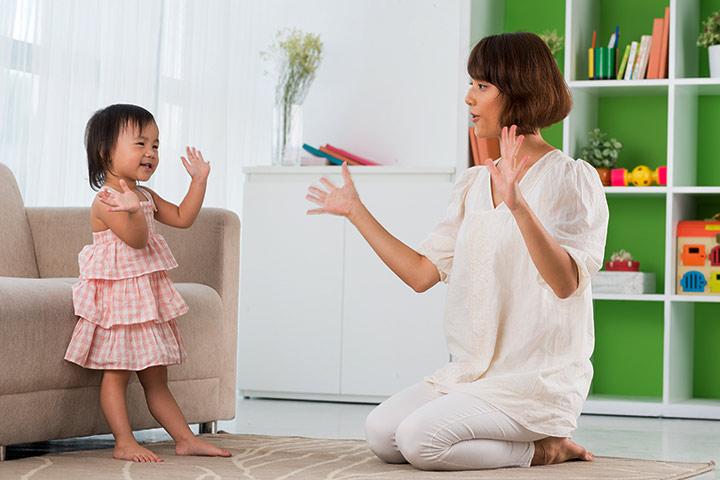 Source: bing.com
Source: bing.comCongratulations! Your baby is now a 14-month-old toddler. This is an exciting and fun time as your little one continues to develop and explore the world around them. In this article, we’ll discuss the physical, cognitive, and social milestones of 14th-month baby development and provide you with tips on how to support your child’s growth and development.
Table of Contents
Physical Development
At 14 months old, your baby is likely crawling, walking, or even running. They are also refining their fine motor skills, such as grasping objects, using utensils, and stacking blocks. Here are some physical milestones you may notice:
- Walking independently or taking a few steps without support
- Crawling up stairs or even attempting to climb
- Ability to throw and kick a ball
- Improved hand-eye coordination and dexterity
- Increased ability to self-feed using utensils
To support your child’s physical development, encourage plenty of active playtime, both indoors and outdoors. Provide a safe and stimulating environment, such as a playpen with toys, and ensure that your child has enough space to move around freely. Offer age-appropriate toys that promote hand-eye coordination and fine motor skills, such as blocks, puzzles, and balls.
Cognitive Development
Your 14-month-old baby is becoming more curious and observant of their surroundings. They are also beginning to understand cause-and-effect relationships and may even start to follow simple instructions. Here are some cognitive milestones you may notice:
- Increased attention span and ability to concentrate on tasks
- Improved memory and recognition skills
- Begins to understand simple instructions and follows them
- Enjoys playing with toys that require problem-solving skills
- May start to imitate adult behaviors, such as talking on the phone
To support your child’s cognitive development, provide plenty of opportunities for exploration and discovery. Offer toys and activities that stimulate your child’s curiosity and problem-solving skills, such as shape sorters, stacking toys, and books with pictures. Encourage your child to ask questions and provide simple explanations to help them understand the world around them.
Social and Emotional Development
At 14 months old, your baby is beginning to develop their own personality and preferences. They are also becoming more aware of their social environment and may start to interact more with others. Here are some social and emotional milestones you may notice:
- Displays a wider range of emotions, such as joy, sadness, and frustration
- Becomes more aware of their own needs and may show signs of independence
- Begins to understand social cues, such as smiling or waving hello
- May start to imitate adult behaviors, such as clapping or waving goodbye
- Enjoys playing with other children and may start to share toys
To support your child’s social and emotional development, provide a nurturing and supportive environment. Offer plenty of positive reinforcement and praise, such as clapping or saying “good job!” when your child accomplishes something. Encourage your child to interact with others and provide opportunities for socialization, such as playdates or visits to the park. Model positive behaviors and emotions, such as sharing and empathy, to help your child develop these skills as well.
FAQs
Q: How many words should my 14-month-old be saying?
A: Every child develops at their own pace, but most 14-month-olds can say a few simple words, such as “mama,” “dada,” and “bye-bye.” Encourage your child’s language development by reading to them, talking to them frequently, and pointing out objects and people in their environment.
Q: How much sleep should my 14-month-old be getting?
A: Most 14-month-olds need about 12-14 hours of sleep per day, including naps. Ensure that your child has a consistent sleep schedule and a quiet, dark environment for sleeping.
Q: How can I promote my 14-month-old’s independence?
A: Encourage your child to do things on their own, such as feeding themselves or picking out their own clothes. Offer choices whenever possible, such as letting your child choose which book to read or which toy to play with. Provide a safe and stimulating environment that allows your child to explore and learn on their own.
Q: What kind of discipline is appropriate for a 14-month-old?
A: At this age, your child is still learning about cause-and-effect and may not fully understand the consequences of their actions. Focus on positive reinforcement and redirection rather than punishment. For example, if your child throws a toy, say “toys are for playing, not throwing” and offer a different toy to play with.
Q: When should I be concerned if my 14-month-old is not meeting developmental milestones?
A: Every child develops at their own pace, but if your child is significantly behind in one or more areas of development or if you have concerns about their health, talk to your pediatrician. Early intervention can make a big difference in helping children reach their full potential.
In conclusion, the 14th month is an exciting time for both you and your baby. By providing a nurturing and stimulating environment and encouraging your child’s curiosity and exploration, you can support your child’s growth and development in all areas. Remember to enjoy this special time and celebrate your child’s milestones along the way!
